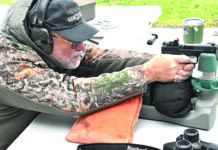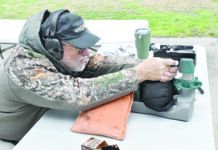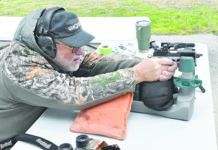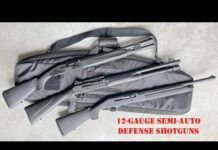In the November 2005 “Downrange” column, I wrote to you after the arrival of Category 5 Hurricane Rita, discussing what our go-to guns were when we were considering bugging out of Houston. Now we’re dealing with the remnants of Category 4 Hurricane Harvey, and the water is Biblically high. Our gun-column angle for this disaster are the legal ramifications of moving guns during emergencies.

A day before Harvey crashed into Corpus Christi, I happened to see an 22-minute video of Edwin Walker, a gun-law attorney for the Walker & Taylor law firm here in Houston, talking about what to do with your guns in the event of an emergency like the one I’m in as I write this. You can find the video on YouTube. Below is a redacted recap of that interview, which, of course, only deals with Texas law, but, then, if you’re a reader in Kansas, you don’t have to plan for hurricanes, so come along for the ride anyway.
Walker said, “Well, obviously, whenever you are making plans to evacuate, you have to make a lot of tough choices about property you’re going to take and property you’re going to leave behind.” He said, “And just like with any other valuable piece of property, you’re gonna make that decision with your firearms. Now, a lot of people will evacuate with their firearms for safety reasons and that’s what we certainly advise people to do. And this points out the importance of having an LTC [license to carry], because if you have an LTC, it gives you a lot more options….”
He further advised to take as many guns as you can with you because guns are relatively small and are a favorite of looters. Also guns rust, so if you know if you’re in a place that you worry about being flooded, you may want to take the guns just to preserve them.
“If you have to leave them, make sure they’re secured in a safe or with gun locks so that nobody can use them in the event that they take them ….,” he said.
“One of the big questions [that comes up] is what can the government do to restrict your right to carry if they declare a state of emergency. The thing about it is, Texas has passed a law that says that the governor does not have the power to affect people’s firearms rights in a state of emergency. So all the laws are still the same; the government can’t take your right to have your firearm away because of the state of emergency if you have a license carry your handguns with you….”
For safety reasons, he pointed out, there is going to be a lot of people looking to take advantage of people who are evacuating, so be wary of that if you get to a hotel that you know and you’re wondering about their gun policy. Just go with whatever is posted on the building, which means that if there is nothing posted on the building, then just simply leave it at that. Don’t go asking management if it’s okay to bring your guns in your room. He said, just assume that it’s okay.
He said, “If for some reason you can’t bring your guns into a hotel, make sure that they are not visible from your car. You don’t want to have any luggage, packages, guns or anything visible. Put them in your trunk, cover them up. Don’t allow them to be seen, and make frequent trips to check on your motor vehicle if you’re worried about looters and thieves.”
He said if possible, stay in a motel where you know the windows face outward and try to get a parking spot right under your windows so you can just look out your window and check on the car and your valuables.
Walker said that once you return, you’ll have concerns about protecting your property, and perhaps even your neighbor’s property, with a firearm.
“This is actually one of the more complex issues in Texas law because Texas is one of the few states that allows somebody to not only use force, but use deadly force, not only in the protection of their own property but in the protection of a third party’s property, and this is a very, very misunderstood application of the law,” he said.
Walker said that what Texans have to remember is that there are no presumptions like those whenever you’re defending yourself or you’re defending a third person to prevent an imminent threat, such as murder, a sexual assault, aggravated sexual assault, or aggravated kidnapping. He said, “The law says that if you have a reasonable belief that those are occurring, then you’re given the legal presumption that your use of deadly force was justified and was reasonable, and so that’s a very, very important thing… Those presumptions don’t apply with regard to property, so even though Texas law says you can use deadly force to defend property, it says that you can only do this if you have a reasonable belief that the property is being threatened, and you have a reasonable belief that the property could not be protected through any other means.”
Also, he pointed out that you may not want to put yourself in harm’s way, so you want to call and wait for the authorities, get valuable information about any lawbreakers, such as how many there are, what they look like, what kind of car they were driving, that sort of thing.
One area to be especially watchful about is, if you have to evacuate your area and you wind up in a shelter which could be in a school, the rules do not change. Walker said, “If you do get evacuated to a shelter and that shelter happens to be property owned by a school district, then the Texas Penal Code applies and you will have to leave your guns in your car—you cannot bring them into the building. Otherwise, you will be committing a felony… If it’s a building owned by an ISD, then it is a school 24 hours a day, 365 days a year.”
The least interesting man in the world says, “Stay dry my friends.”




























